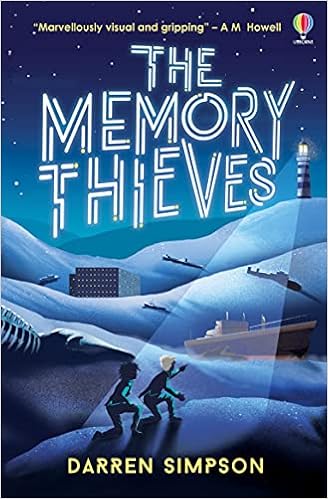

Darren Simpson and I have been chatting about news stories and the lack of empathy some receive. As part of EmpathyLab’s 2021 celebrations, we were tasked with hunting down a suitable news story and re-writing it with an Empathy twist!

Once we did this I thought it would be nice to go the extra mile and chat to Darren about empathy in the broader sense and relate it to his own experiences and books. Read on for his brilliant answers and recommendations!
How easy or hard was it to find a news story where empathy was lacking?
Finding a news story to use for this activity was a thought-provoking experience. News stories featuring a lack of empathy were all too abundant, and sadly often national or global in scale. This got me down at first, until I remembered that the bad things we do make the headlines more often than the good. That’s just the way the news seems to work, sadly, which raises questions in itself. Anyhow, I started looking at community-level news, and was soon feeling reassured by stories that wouldn’t lend themselves to this activity, since they featured displays of empathy already. In the end I used a story about no-one turning up to the birthday party of a boy with Down’s Syndrome. As a parent, I related to the mother’s heartbreak, and even found myself welling up when I watched the clip of her in tears. It was a moment of strong emotional resonance, so I knew this was the story I wanted to turn around with an empathetic act of kindness.
How can we encourage and promote empathy?
Going back to the point about the news reporting the bad more than the good, I wonder whether more acts of empathy in the press might help. Children’s books, films and TV shows are filled with role models showing young people how to be kind and respectful of others’ feelings. But when you look at the news presented to adults through social media and the press, it’s largely about criticism, blame, mockery or malice. Wouldn’t it be great if efforts to connect emotionally – and the goodness that can occur as a result – were celebrated more widely in the news? I mean, sure: every person trying to connect and do a good deed will face some mockery in comments sections and the like; there’ll always be trolls and haters. But there will also be people who are touched, or who at least give such news the thought it deserves; people who’ll relate and be inspired to exercise more empathy themselves.
This isn’t only about social media and the news, of course. Every time we draw upon and show empathy in our day-to-day lives, we’re not just relating to and helping someone; we’re also being role models who can spark empathy in others, who in turn will hopefully do the same.
In short, I like to think that empathy in humans is natural and self-perpetuating. We just need to help it along with some thoughtfulness, effort and praise – and of course, by reading and sharing books!
What element of empathy can we find in your books, Scavengers and the soon-to-be-published The Memory Thieves?
It’s honestly such an honour to see Scavengers selected for the 2021 Read for Empathy Collection. Empathy Lab say Scavengers is about connection and breaking down walls, and that pretty much sums the empathy element up. Scavengers encourages readers to question the walls of division, blame and fear built around them by others (including the press I talked about above). It’s a story that challenges notions of us vs them, and which prompts readers to consider complexities, grey areas, and the connections we have with people that we might not otherwise imagine. And that’s where empathy can do powerful things.
The Memory Thieves comes out this August, and uses a somewhat magic realist, almost sci-fi story to explore the risks of emotional evasion and repression. Empathy is key to The Memory Thieves, not only because the reader experiences an emotive journey with the protagonist, but because the book’s central message is about being emotionally honest to yourself and to others. It’s a book about sharing your feelings with the people you trust, so that they can empathise and relate. Empathy is so important to healing, coping and mental health.
Do you have any book recommendations for readers where empathy abounds?
Here’s a selection of recent reads that come to mind (some of which are in the Read for Empathy Collection), either because they demonstrate wonderful acts inspired by empathy, or because they’ve stirred a strong emotional response in me while reading.
· The Life and Time of Lonnie Quicke by Kirsty Applebaum
· Boy, Everywhere by A.M. Dassu
· The Lost Child’s Quest by James Haddell
· The Outrage by William Hussey
· Freedom by Catherine Johnson
· Cane Warriors by Alex Wheatle

